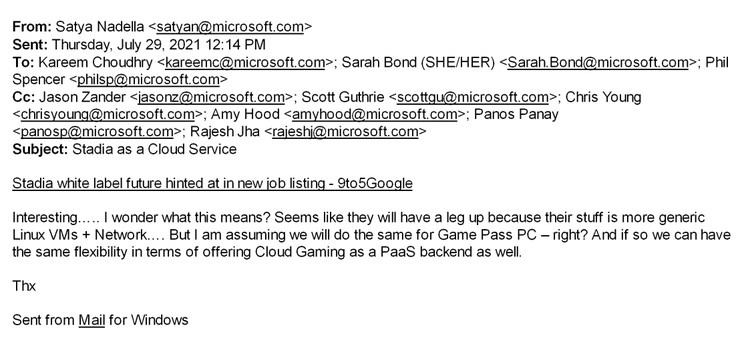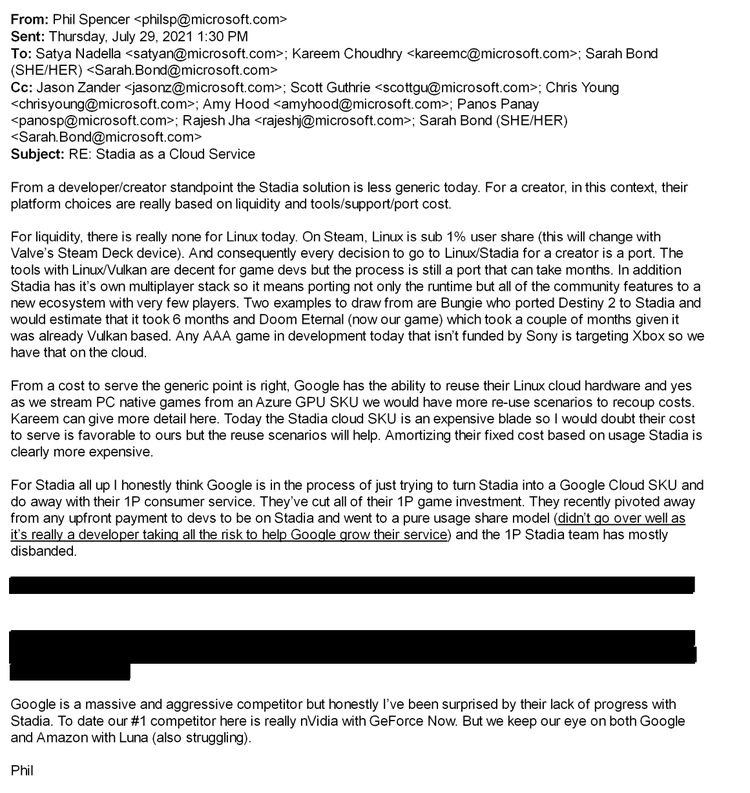
As a part of Google’s attempts to salvage Stadia before its shutdown earlier this year, the company pivoted the service to offer game developers a way to provide demos of their games based on Stadia tech. That white-label service caught the attention of Microsoft, which has been working on the ability to stream PC games through the cloud in the same fashion Stadia was trying to do.
Google’s “Immersive Stream for Games” project took what worked about Stadia – the tech – and tried to use it as a way for developers and companies to directly deliver games to customers without having to build out their own infrastructure. AT&T used the tech to give its customers access to Batman: Arkham Knight, as well as Control. Capcom also used Immersive Stream to offer a free demo for Resident Evil: Village.
As it turns out, the idea sparked a conversation within Microsoft, as The Verge reports.
Documents from the ongoing FTC legal battle reveal that Microsoft CEO Satya Nadella emailed Phil Spencer (head of Xbox), Kareem Choudry (head of Xbox cloud gaming), and Sarah Bond (head of Xbox creator experience) at the Xbox team in regards to the reports that Google was working on a white-labeled version of Stadia, asking how Microsoft could do something similar.

Fun enough, Satya sent the team 9to5Google‘s coverage of the white-label rumors.
In follow-up emails from Phil Spencer and the rest of the team, it was revealed that Microsoft could use Azure to do the same thing Google was trying to do. The emails also show that, in July 2021, the company was indeed working to stream PC games, and that work appears to be continuing to this day. The Verge references a deal with EE that Microsoft signed that would bring PC games via a cloud service, but EE doesn’t have its own cloud gaming offering. That’s not exactly confirmation, but it’s a strong hint that Microsoft may be working on a sort of white-label service.
A lengthy email from Phil Spencer also went into comparing how Azure could handle the same reuse as Stadia was doing with Google’s cloud services. The executive also commented on the “lack of progress” Google was seeing with Stadia and how he was surprised by that, previously saying that he felt Google was trying to turn Stadia into a Google Cloud SKU and do away with their [first-party] service.”

Elsewhere in the FTC case documents, comments from Stadia lead Dov Zimring confirmed that it was the lack of players and games in a “self-sustaining cycle” that led to Stadia’s death.
More on Cloud Gaming:
- Stadia’s death was due to a ‘self-sustaining cycle’ of lacking games and players, lead says
- Xbox Game Pass is now streaming on Nvidia GeForce Now
- Samsung’s 2020 smart TVs gain select cloud gaming platforms
FTC: We use income earning auto affiliate links. More.





Comments